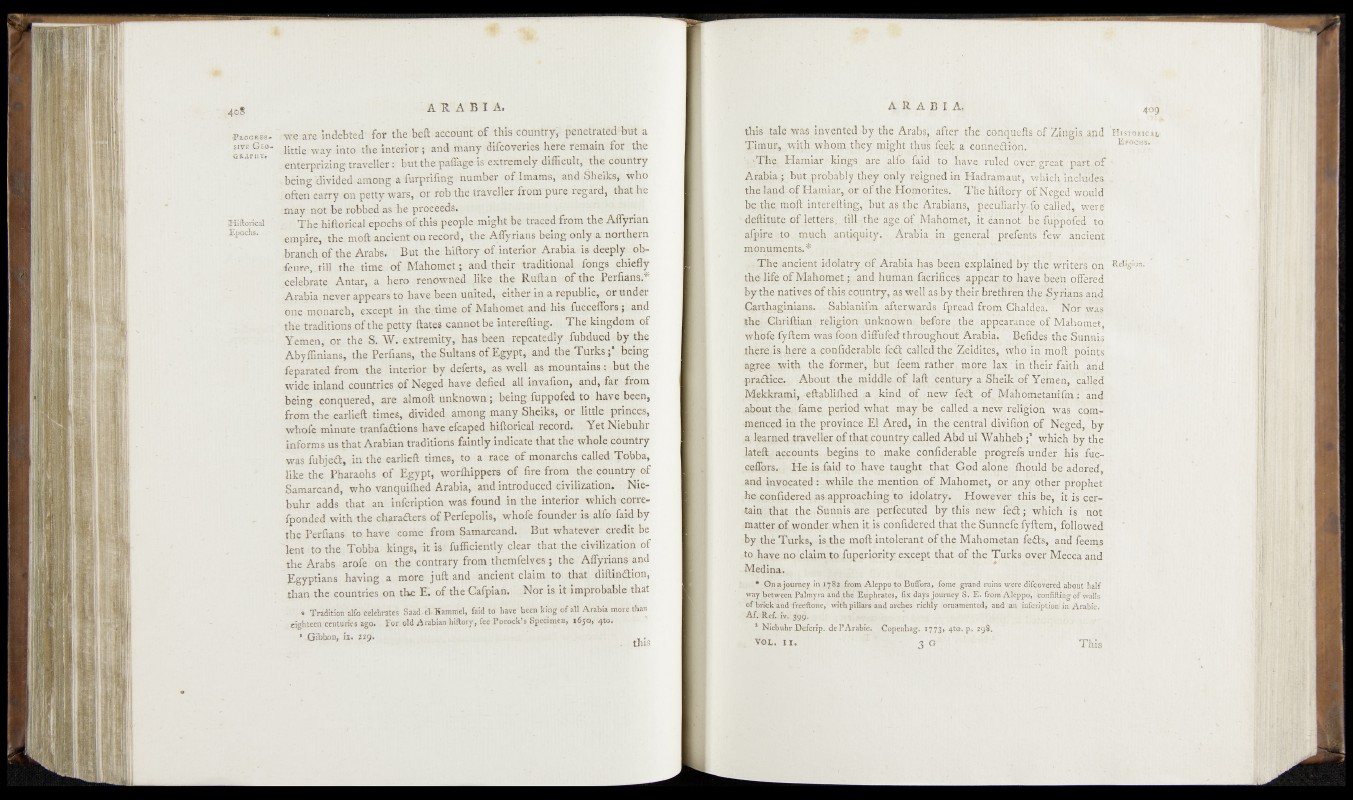
■ ■ I
i
■is
40S
-P r o g e .e s - ■ 1 ■(1 o.
• G RA PH * .
Hiftorical
Epochs. -
A R A B I A.
'.-we are indebted for the beft account of this country, penetrated but a
little way into the interior; and many difcoverie&.here remain; for the
enterpri7.ing traveller : but the pafiage is extremely difficult, the country
- being divided-among a furprifing 'number of Imams, and Sheiks, who
. often carry on petty wars, or rob the traveller from pure regard, that he
may not be robbed as he proceeds. < ' 1 ‘ 1 ’
. • The hiftorical epochs of this people might be traced from the A d rian
'empire, the moft ancient on record, the Affyrians being, only a northern
i^ n c f to f the Arabs. But the hiftcJry of. interior Arabia, is- deeply-^ oh-
sieiire^tift the time of Mahomet.; and their ;traditionabfbngs .chiefly
^eicbmte Antar, a hero renowned;.Jflke the Ruftan of the Perfians;*
Arabia.never appears tq have been united,- eitherin a repuhiic^ or under
one monarch, except in the.time of Mahomet|and his luccefibrs j and
the traditions of the petty ftates cannot be interefting. The kingdom of
Yemen; o rth e S . W. extremity, has been repeatedly, fnbdu£d;by:the
Abyffinians, the Perfians, the Sultans of Egypt,- and the Turks
ieparated from the interior by deferts, as,-well as mountains-: - btitqthe
wide inland countries of Neged have defied all invafion, and, far from
being conquered, are alnaoft unknown; being fuppqfed ,to havejbfen,
from the earlieft times, divided among many Sheiks, or -little -princes,
wbbfe minute tranfaftions have efcaped hiftorical -record., Yet Njqbuhr
informs us that Arabian traditions faintly indicate that the whole country
was fubjeft, in the earlieft times, to a race, of monarchs called;Tobba,
like the, Pharaohs of Egypt, worihippers of fire from the country of
Samarcand, who vanquilhed Arabia, and introduced civilization. Niebuhr
adds that an infcription was found in the interior which'corre-
fponded with the chgrafters of Perfepolis, whofe founder is alfo faid by
the Perfians to have come from Samarcand. But whatever credit be
len t to the Tobba kings, it is fufficiently clear that-the civilization of
the Arabs arofe on the contrary from themfelves ; the Affyrians and
Egyptians having a more juft and ancient claim to that diftinftion,
than the countries on the El of the Cafpian. Nor is it improbable that
- # Tradition alfo celebrates Saad-el-Kammel, fai,3 td have been king of all Arabia more than
eighteen centuries ago. Eor old Arabianljiftory, fee Pocock’s.Specimen, ^.to.
* .Gibbon, ix. 2*9'. ^ . . 4
AR A B I A ;
this tale was Invented -by the Arabs, after the conquefts of Zingis.cnd
T-imur, with;;wh^m„|hgy- rjilgfit thus ;feek‘ a connexion.
1 -The Hamiar ki.ogs^re alfofr faM- to have ruled oyer,, great. part of
Arabia ; but probably they only leignpd in Hadramaut/ whlcli inclucW'
the land of Hamiar, or of the, Homorites. . The hiffory of Neged would
be, the moft interefting,',, but as the‘ Af^iaps, .neC^Lrlyfo called, were
deftitute ofjlettprs, .tflUtnf ^gc,oT Mahom^tjUt can non he fuppofea to!
a|p|rq >to / pjuch antiquity.,-, Arabia* in. general! prefents few ancient
monuments,* J,
The sancient -idqlatry.pfAraM#! fes^jijeaQ/explalned by the writers on
the 11% ofjMahomet ^„and humajh facrmces appear to hkve beeh offered
by the natives of thisf)cquptry, as..iVell aSvby.th'eir bretnren lhe*>yrians and
Carthagim^ng. ,^|l^a^fn^^^rw-apds fppead from’ .Gh^aeafti Nor was
|he Chriftianj reg io n unknownt.hefRre , the.--appearance of Mahomet
whofe fyftem wasTbon diftufed throughout Arabia, Betides. the Sunnis
.thesis^ere a.pbp^fidpabl^ feft c,afted|^he, Zcidites,. vmo inunoft ‘points
agrees with format Aut>;feem mbfr. mo're "lax' im^^irTaitli ana
.pra<9^,Ge. About tlie^middfe of laft centyry a Sheik of Yemen^caUed
M|ki.r^ni, -eftablifliecLja ,kind q^rnew/e^/'p^Mmometairiftn : and
afrpnt p^iod what may be called.a jie^rpligion, was commenced
in the province El Ared, in the central diyifion of Negecl, by
-a; %i^ued ,tr^vel%r of that country called Abd ul Wahheb*;* which by the
lateft.accounts begins.to .make co.nfiderable prbgrefs nnfler his iuc-
oeffors. He is faid to have taught that. God .alone fftvould be adored!,
and, inypeated : yfl^ile .the mentiqn^of Mahomet, or any other prophet
he confidered as approaching to idolatry. Howpyer this, be,', if.Ys cifr
-tain that the ,Sunnis^are perfecuted by this neyr ,fe(ftJ; which % '‘not
matter of wonder when it is poqudered that the S.unnele fyftem, followed
by. the Turks, is tfie moft intolerant of the Mahometan lefts; and feems
to have no claim, to Superiority except that of the Turks-ovef Mecca and
Medina.
if * On »journey in 178* from Aleppo to Buffora, fome .grand-nuins^efe diicbvefed about half
way between Palmyra ahdthe Euphrates, fix days journey S. E. from Aleppo; cobaftifigof walls
of brick and freeftone, wit-h pillars and arches; richly ornamented, and infcelpticihln Arabic.
A f ’
1 Niebuhr Defcrip. de l’Arabie. ‘.Copenhag. 1773, 4*0. p. 298.
I if©*,, 11, ^ .3 cr
4°9
HlSfOJJtCAf Ef-tSTHS.' -
Religion.
This